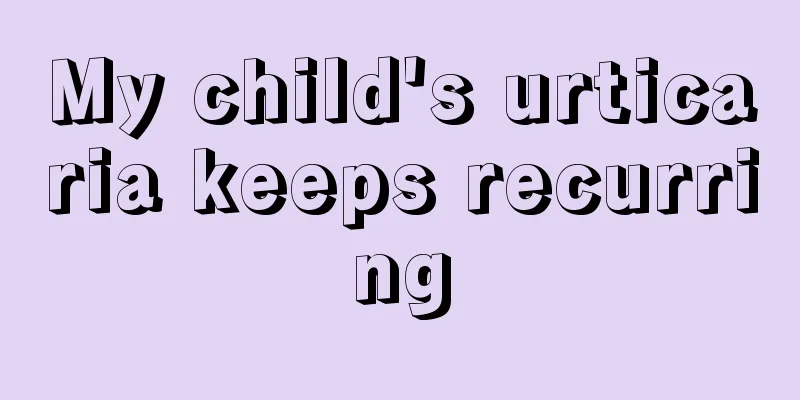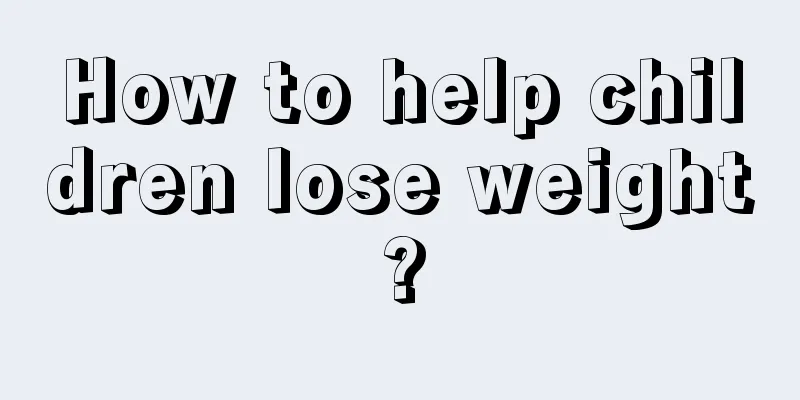My child's urticaria keeps recurring

|
Young children are a high-risk group for urticaria. Once urticaria occurs, it will cause great distress to the patient's physical and mental health. At the same time, urticaria is a disease that is difficult to cure completely. So what effective methods should parents take to treat recurring urticaria? Traditional Chinese medicine believes that the key to treating urticaria is to find its allergens and then choose to apply anti-itching lotions or medications for effective treatment. 1. Find and eliminate allergens Treat the disorder causing urticaria. Autoimmune urticaria is difficult to treat, but giving intravenous immune globulin or plasma dialysis can relieve symptoms. 2. Apply anti-itch lotion topically Such as calamine lotion (with menthol added) or zinc oxide lotion. 3. Medication (1) Oral antihistamines. Commonly used first-generation antihistamines include chlorpheniramine maleate tablets, promethazine hydrochloride, diphenhydramine, doxepin, ketotifen, etc.; second-generation H1 receptor antagonists have the advantages of good efficacy and no obvious central nervous system inhibitory effect. They can be used for children over 2 years old. Second-generation antihistamines include cetirizine hydrochloride, loratadine, levocetirizine, desloratadine, fexofenadine, acrivastine, ebastine, epinastine, mizolastine, olopatadine, etc. Take orally once daily. Calcium supplements and vitamin C can reduce the permeability of capillaries and help relieve symptoms. The combination of H2 receptor antagonists (such as cimetidine and ranitidine) and H1 receptor antagonists can treat acute urticaria with obvious abdominal pain. Cyproheptadine can be used to treat chronic or cold urticaria. (2) For stubborn cases, oral prednisone tablets or intravenous hydrocortisone may be used as appropriate, but it is not a routine medication. Different drugs have significantly different minimum age limits and dosages, and should be used in accordance with the drug instructions. In children who do not respond to treatment, a combination of first-generation (for evening use) and second-generation (for daytime use) antihistamines can be used, but care should be taken to avoid the use of sedating antihistamines in school-age children. 4. Symptomatic treatment Children with bronchospasm or laryngeal edema can be given a subcutaneous injection of 1:1000 epinephrine solution. 5. Desensitization treatment For chronic urticaria that is not well responded to conventional drug treatment, corresponding desensitization treatment can be given according to the results of allergen skin tests, which can often achieve certain results. What medicine can cure urticaria quickly? 1. Pay attention to diet The onset of urticaria has a certain relationship with diet, and certain foods may be triggers. For example, fish, shrimp and seafood, canned food, pickled food, beverages containing artificial colors, preservatives, yeast and other artificial additives can induce urticaria. In addition, irritating foods such as overly sour and spicy foods will also reduce the digestive function of the gastrointestinal tract, causing food residues to stay in the intestines for too long, thereby producing peptones and polypeptides, increasing the chance of allergies in the body. 2. Pay attention to hygiene It is very important to prevent mites at home; keep fewer pets such as cats and dogs at home. Prevent children from coming into contact with pollen and avoid activities under trees, in grass, etc. 3. Pay attention to weather changes Keep warm to avoid cold urticaria; children with urticaria should wear loose and breathable clothing to avoid irritation to the affected area. 4. Pay attention to medication Some drugs can cause urticaria, such as antibiotics such as penicillin, tetracycline, chloramphenicol, streptomycin, sulfonamides, polymyxin, antipyretic analgesics such as analgin and aspirin, etc. If allergic symptoms occur while using these drugs, use should be stopped immediately and urticaria combination therapy should be used promptly for treatment. 5. Take breaks Ensure adequate sleep and a regular life to enhance the body's immunity. |
<<: Child convulsing and foaming at the mouth
>>: Tuina techniques for strengthening the spleen and stomach in children
Recommend
What to do if baby's hair is thin and yellow
Nowadays, babies’ health is not as good as before...
The child does not eat breast milk but only eats from a bottle
Because babies mainly bite the mother's nippl...
What to do if your child has a dry cough without sputum
I believe that many parents are very concerned ab...
What are the dietary treatments for pharyngitis in children?
Pharyngitis is one of the most common oral diseas...
How to prevent fever in children
Children are the treasures of their parents. If t...
What should I do if my three-month-old baby has diarrhea?
Many babies will have diarrhea symptoms. This is ...
Can babies with constipation drink sesame oil?
If your baby has not had a bowel movement for mor...
Have you learned the massage technique for baby's dacryocystitis?
When a baby gets dacryocystitis, mothers must not...
Baby has diarrhea after taking jaundice medicine
Nowadays, many newborns have severe jaundice, so ...
What to do if a 7-year-old child has a picky eater
Children's picky eating habits are a headache...
How can children grow taller if their parents are short?
We usually see other children are very tall, whil...
What to do if your child is afraid of injections
Many children are particularly afraid of injectio...
What should children pay attention to when eating pagoda candy?
It is normal for babies to be playful. Children a...
What is the scientific method to correct children’s stuttering?
When a child stutters when speaking, parents usua...
What is the reason for the baby's red eyelids?
The skin of a newborn baby is relatively tender. ...









